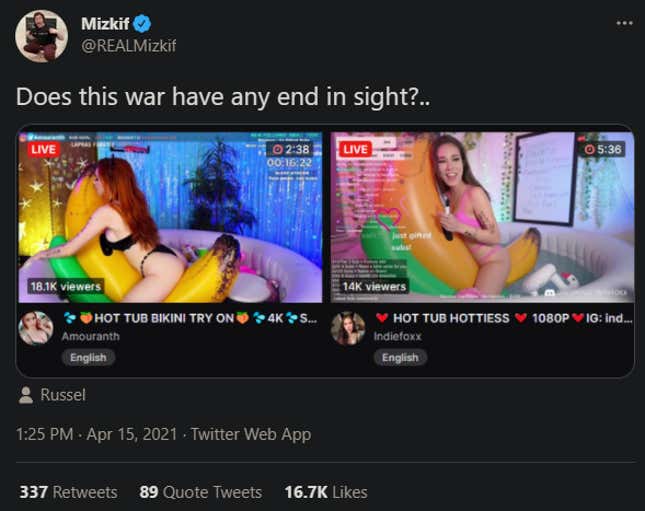
It’s hot tub stream summer, and everybody’s got an opinion. This week, for example, the biggest streamer on Twitch, Félix “xQc” Lengyel, called hot tub streams “trash,” saying that they’re “the most pathetic thing we’ve seen on Twitch in forever” and petitioning for them to be removed from the front page. It was the latest in a long line of similar opinions from names both big and small that date back to when hot tub streams first popped off in March. But according to hot tub streamers, this trend, like any other, is already coming down from its peak.
Hot tub streams, in which streamers sit in hot tubs and chat with their audiences while wearing swimsuits, are not against Twitch’s rules. Nonetheless, much of the discourse surrounding them has focused on what women should and should not be allowed to wear on stream. Viral tweets, some of which haven’t even been intended as criticism, have attracted hordes of angry hangers-on who feel that streamers are somehow subverting Twitch’s rules in the name of promoting sexual content. Others have expressed concern that these broadcasts steal viewers from more deserving streamers. Arguments against hot tub streams run the full gamut of classics that have been weaponized against women in the past.
“This hot tub meta is like a Twitch Rorschach test,” Kaitlyn “Amouranth” Siragusa, who has participated in the hot tub meta and is one of the most popular female streamers on Twitch, told Kotaku in an email. “People extrapolate their own agenda onto the meta. There are two re-occurring themes that people go back to: 1) Twitch is for gaming or 2) Twitch is unfair towards male streamers—alternatively, Twitch is more lenient on female streamers.”

Lengyel’s focus on Twitch’s front page is especially notable. Many other Twitch streamers and viewers have made similar assertions—that Twitch is in a dire state, and the evidence of that is as plain as a sunny day as soon as you open the site. But if you check Twitch’s front page or Just Chatting directory (where most hot tub streams tend to occur) at any given moment, you’ll often only find a small handful within the top 100 most-viewed streams—sometimes as few as one or two. The trend, despite discussion to the contrary, does not appear to have taken over Twitch.
There are many reasons for this. One is that most popular hot tub streamers don’t just sit in bubbling vats all day and slowly transform into shriveled prune people.
“I personally only do hot tub streams about once a week on Saturdays, with the exception every now and then of a random week day,” XoAeriel, who says she functionally invented the current hot tub meta by being the first streamer to use an inflatable hot tub, told Kotaku in an email. “Outside of hot tub streams I do mostly Just Chatting, and then I play games such as Cold War and Fortnite usually later in the evening. I’ve done quite a few IRL streams as well, such as Topgolf, wineries, and dinners. I wouldn’t consider myself a ‘hot tub streamer’ but [instead] a variety streamer.”
“I’ve been on this platform for a good 3.5 years, and I’ve done gaming, but my main thing is hula hoop dancing and cosplay,” Spoopy Kitt, another streamer who’s grown significantly in popularity thanks to hot tub streams, told Kotaku in a DM. “I’ve gotten hate comments from all of it. Some people will find any reason to tear you down. Just do you, can’t make everybody happy.”
The other reason Twitch isn’t drowning in hot tub streams, according to some who’ve benefited from doing a few themselves, is that the gold rush is already over.
“I actually think hot tub streams are oversaturated a little,” said XoAeriel. “I have recently seen a dramatic drop in viewage, since there are so many girls always in the hot tub. In a way I think it’s just less unique now.”
“Hot tub streams are dying off, slowly but surely,” Firedancer, a streamer who’s grown more modestly as a result of the meta, told Kotaku in a DM. “The numbers aren’t as high as they were for smaller streamers like myself, but I still enjoy doing them.”
That’s not to understate the extent to which some streamers have benefitted from spending a few hours in the tub here and there. Since the end of March, Siragusa has gained almost 500,000 followers. Indiefoxx, the second biggest streamer to regularly stream from a hot tub, has gained almost 300,000—though she said during a recent stream that she’s getting tired of spending so much time in a tub. Others like Spoopy Kitt and XoAeriel haven’t made leaps quite so large, but they’ve still pulled in tens of thousands of new viewers in just a couple months.
Streamers are also finding ways to keep tub time interesting. Siragusa, for example, now hosts a podcast in which she and other participants—like comedic streamers CodeMiko and PaymoneyWubby—all gossip from their own respective hot tubs, inflatable, virtual, or otherwise.
As a result, Siragusa, who prides herself on being data-driven and adaptable, thinks there’s still wind left in the hot tub meta’s sales, and contrary to popular belief, she thinks it’s doing more good for Twitch than bad.
“The data indicates that some of the viewers stick around for gaming and other activities,” she said. “I can play games or just talk to my chat sitting at my desk to 10,000 concurrent [viewers] nowadays. I imagine internally Twitch is seeing a huge surge/influx of people coming from off-platform, people who likely become recurring users. It’s hard to buy marketing like that. The meta is generating a lot of mindshare, and it piques people’s curiosity. I think the narrative that it ‘takes viewers away from other creators’ is false, and the girls engaged in hot tubbing are doing the yeoman’s work of growing the whole viewership pie.”
Despite complaints that women have it easier than men on Twitch, the negative sentiment surrounding hot tub streams is certainly generating one thing that makes their lives harder: harassment.
“Because so much attention has been brought to hot tub streams, harassment has gone way up,” said Firedancer. “People jump on cancel culture trends, and although these types of streams are fun and not breaking any rules, some viewers and other streamers are unable to simply scroll past without voicing their opinions. Some viewers have gotten very toxic in the last few weeks.”
XoAeriel said she tries to ignore the harassment, of which she now receives “a lot,” while Spoopy Kitt thanked her moderators, “the true unsung heroes of Twitch,” who shield her from some of it.
“I have learned to just roll with it in regards to the toxic side of Twitch popularity,” said Siragusa. “I’ve seen a lot of more conservative (in terms of attire or demeanor) female broadcasters get undue hate or sexual harassment regardless.”
Siragusa, then, can’t help but see the entire premise of people’s visceral reaction to hot tub streams—that women are getting preferential treatment on Twitch—as flawed.
“I don’t think girls are on balance treated better than guy streamers with regards to moderation enforcement,” she said. “That is a very unpopular opinion, but I think a lot of the perceived asymmetry is caused by Twitch not publicizing the reason they are taking enforcement action against a streamer. Social media loves opining about topics when there is imperfect information.”
Twitch’s lack of transparency has caused streamers and the company countless headaches over the years—even, (again) contrary to popular belief, in the case of hot tub streams. While one streamer, Imjasmine, recently got suspended for a pretty clear wardrobe malfunction while streaming from a hot tub, Indiefoxx received a suspension earlier this month not for streaming from a hot tub, but for “selling Twitch services or features,” a violation she could not figure out the origin of. She ended up deeming the suspension “excessive.”
So while many streamers and viewers want Twitch to treat symptoms of its transparency problem with even stricter rules, Siragusa thinks the real solution is authentic, consistent transparency on Twitch’s part.
“Even if we hypothetically conceded that female streamers have more leniency, I always find it rather amusing that people argue so hard for Twitch to be more strict with regards to its [terms of service] rather than less,” she said. “If two people are perceived to break the same rule and one receives a ‘lesser sentence’ there is so much more buzz around making sure the person with the shorter suspension gets ‘banned longer.’ Twitch is already much more strict than, say, YouTube with regards to content moderation. I think that in cases where there seems to be ambiguity or inequity around ToS enforcement, it would be far more constructive if the community rallied behind the more forbearing enforcement action/ToS interpretation. But I guess that’s not how the internet works.”
.